ESET researchers have identified five campaigns targeting Android users with trojanized apps. Most probably carried out by the Arid Viper APT group, these campaigns started in 2022 and three of them are still ongoing at the time of the publication of this blogpost. They deploy multistage Android spyware, which we named AridSpy, that downloads first- and second-stage payloads from its C&C server to assist it avoiding detection. The malware is distributed through dedicated websites impersonating various messaging apps, a job opportunity app, and a Palestinian Civil Registry app. Often these are existing applications that had been trojanized by the addition of AridSpy’s malicious code.
Key points of the blogpost:
- ESET Research discovered three-stage Android malware, which we named AridSpy, being distributed via five dedicated websites.
- AridSpy’s code is in some cases bundled into applications that provide legitimate functionality.
- While the first stage of AridSpy has been documented previously, here we also provide a full analysis of its previously unknown later stages.
- AridSpy is a remotely controlled trojan that focuses on user data espionage.
- We detected six occurrences of AridSpy, in Palestine and Egypt.
- We attribute AridSpy with medium confidence to the Arid Viper APT group.
Arid Viper, also known as APT-C-23, Desert Falcons, or Two-tailed Scorpion, is a cyberespionage group that has been active since at least 2013. Known for targeting countries in the Middle East, the group has drawn attention over the years for its vast arsenal of malware for Android, iOS, and Windows platforms. We reported on the group and its then-newest spyware in a previous blogpost.
Overview
ESET Research identified five Arid Viper campaigns targeting Android users. These campaigns delivered malware via dedicated websites from which victims could download and manually install an Android application. Three apps provided on these websites are legitimate apps trojanized with malicious code that we named AridSpy, whose purpose is espionage. You can see the overview scheme in Figure 1.
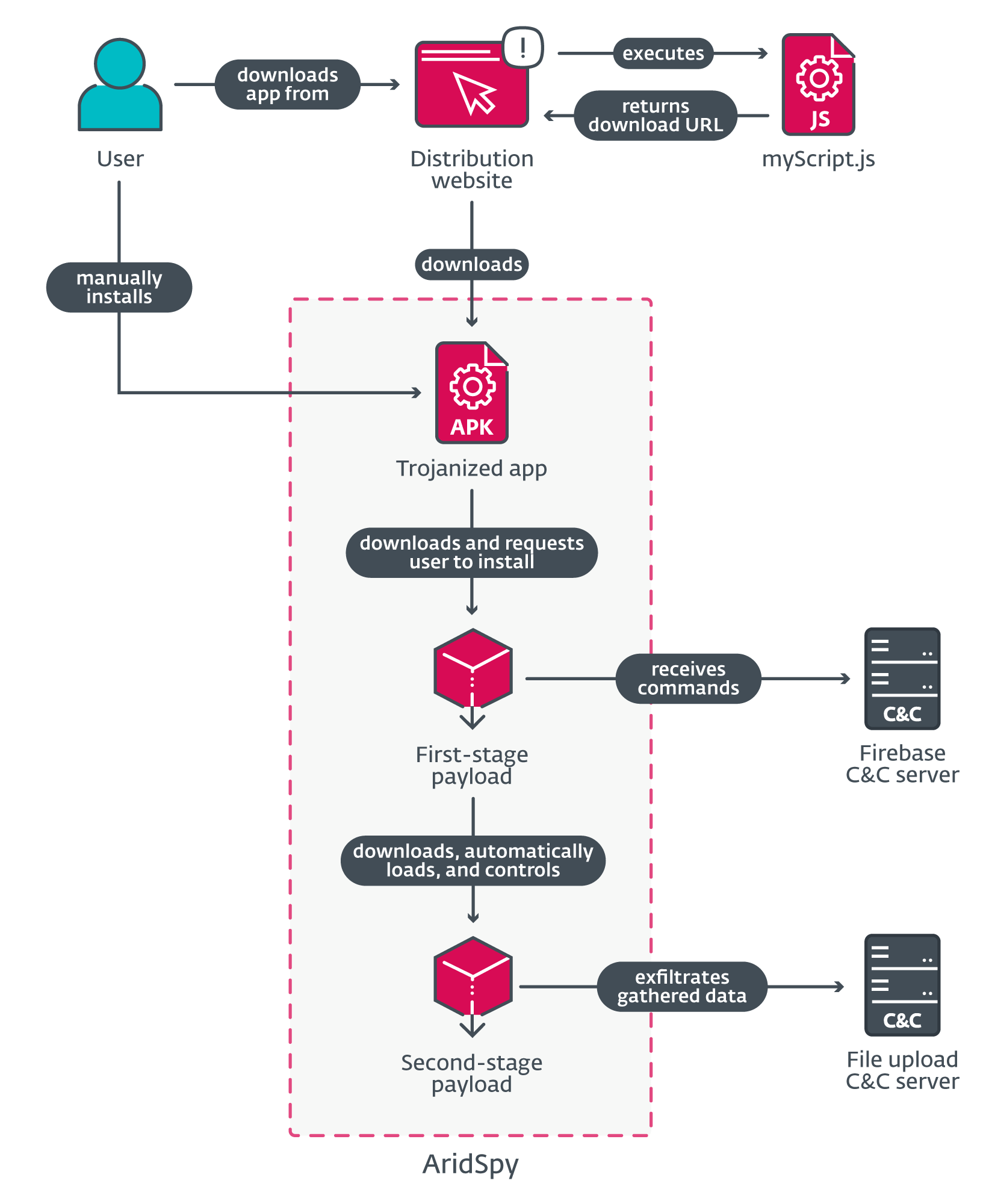
AridSpy was first analyzed by Zimperium in 2021; at the time, the malware only consisted of a single stage, with all the malicious code implemented in the trojanized application.
The second occurrence of AridSpy that ESET Research identified was being used in 2022 (and later analyzed by 360 Beacon Labs in December 2022), where the malware operators targeted the FIFA World Cup in Qatar. Impersonating one of the many Kora applications, the campaign deployed the Kora442 app bundled with AridSpy. As in the case of the sample analyzed by Zimperium, the malware still only had one stage at this time.
In March 2023, 360 Beacon Labs analyzed another Android campaign operated by Arid Viper and found a connection between the Kora442 campaign and the Arid Viper group, based on use of the myScript.js file mentioned in Figure 1. We found the same connection in the campaigns discussed in this blogpost (as explained in the Attribution section). It has proven to be a useful indicator to identify additional Arid Viper distribution websites.
In August 2023 we logged a detection of AridSpy in our telemetry and investigated further. We identified targets in Palestine and Egypt. New in these campaigns, AridSpy was turned into a multistage trojan, with additional payloads being downloaded from the C&C server by the initial, trojanized app.
At the time of this publication, three out of the five discovered campaigns are still active; the campaigns used dedicated websites to distribute malicious apps impersonating NortirChat, LapizaChat, and ReblyChat, and the تطبيق المشغل (machine translation: Operator application; we will refer to this as the job opportunity app) and السجل المدني الفلسطيني (machine translation: Palestinian Civil Registry) apps. We discovered the following distribution websites via our telemetry, VirusTotal, and pivoting on the shared myScript.js script using the FOFA network search engine (which is an alternative to Shodan and Censys):
- lapizachat[.]com
- reblychat[.]com
- nortirchats[.]com
- pariberychat[.]com (inactive)
- renatchat[.]com (inactive)
Parallel to our investigation, the FOFA research team published a blogpost that discusses discovering seven distribution websites with the myScript.js JavaScript file responsible for retrieving the download paths for Arid Viper payloads. Four of these websites distributed various versions of AridSpy. The following two were previously unknown to us:
- clemochat[.]com
- voevanil[.]com
In this blogpost, we focus on AridSpy payloads that we could obtain from all the confirmed active distribution websites listed above.
Note that these malicious apps have never been offered through Google Play and are downloaded from third-party sites. To install these apps, the potential victim is requested to enable the non-default Android option to install apps from unknown sources.
Victimology
Altogether we detected six occurrences of AridSpy in our telemetry, from Palestine and Egypt. The majority of the spyware instances registered in Palestine were for the malicious Palestinian Civil Registry app, with one other detection not being part of any campaign mentioned in this blogpost. We then found the same first-stage payload but with a different package name in Egypt. There was also another first-stage payload detected in Egypt, one that uses the same C&C servers as the samples in the LapizaChat and job opportunity campaigns.
Attribution
We attribute AridSpy to Arid Viper with medium confidence, based on these indicators:
- AridSpy targeted organizations in Palestine and Egypt, which fits a subset of Arid Viper’s typical targeting.
- Multiple AridSpy distribution websites use a unique, malicious JavaScript file named myScript.js, which has been previously linked to Arid Viper by 360 Beacon Labs and FOFA.
myScript.js was first discovered and linked to Arid Viper in 360 Beacon Labs’ March 30th, 2023 analysis of a different Android campaign operated by Arid Viper. The (unnamed) malicious Android code used in that campaign was previously attributed to the Arid Viper group. myScript.js was found on one of the distribution websites used in the campaign. The purpose of this JavaScript code was to download a malicious Android app hosted on the distribution server.
Figure 2 shows the part of the code that registers the handler for clicks on the website’s Download button, and Figure 3 displays JavaScript code that generates file paths to download the malicious app.

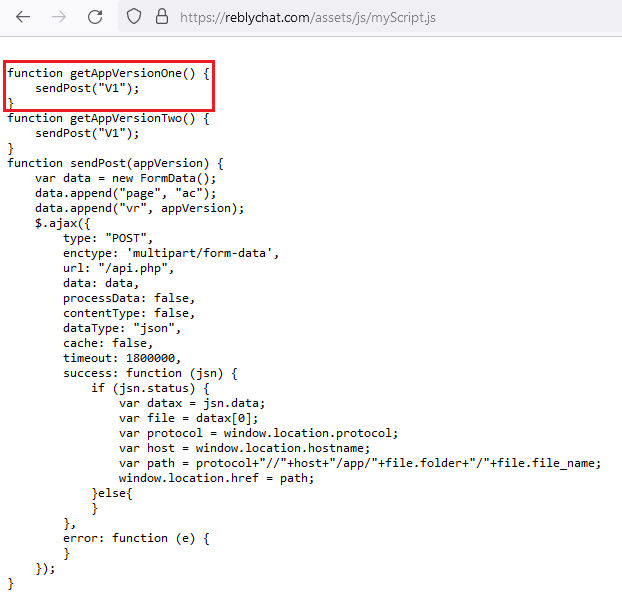
As pointed out by 360 Beacon Labs, this same JavaScript code was also used in the campaign that targeted the FIFA World Cup in Qatar with an earlier version of AridSpy, which we reported in 2022. In both campaigns, the distribution websites used this specific myScript.js script to retrieve a malicious app from a server, although the final payload was different.
Finally, we found a very similar piece of JavaScript on the distribution websites for the campaigns discussed in this blogpost, distributing NortirChat, LapizaChat, and ReblyChat. During our investigation, this linkage was independently confirmed by the research team of the FOFA search engine, who found seven of the same distribution websites that contained the myScript.js responsible for downloading Android AridSpy, and attributed this malware to Arid Viper.
We have not been able to link the JavaScript code used in these campaigns to any legitimate or open-source project, which leads us to believe that this script is most likely specific to various Arid Viper campaigns distributing Android malware.
It is possible that Arid Viper reused this distribution method, but switched to a new tool, AridSpy, for its new campaigns, since the (unnamed) malware family the group used before was disclosed and analyzed by various researchers and security companies.
Interestingly, we also discovered a different version of myScript.js on the AridSpy distribution site, masquerading as a Palestinian Civil Registry app. In this case, the script had the same purpose but not the same JavaScript code: instead of downloading AridSpy, this script just returned a hardcoded link to AridSpy.
This version of the script is based on a script available online, contrary to the earlier versions that appear to use a custom-developed myScript.js file. When the earlier versions of myScript.js were disclosed and attributed to Arid Viper, the threat actors most likely changed its code to avoid their new code being connected to the group.
Technical analysis
Initial access
The distribution mechanism is very similar for all campaigns mentioned in this section. In order to gain initial access to the device, the threat actors try to convince their potential victim to install a fake, but functional, app. Once the target clicks the site’s Download button, myScript.js, hosted on the same server, is executed to generate the correct download file path for the malicious AridSpy. This script makes an AJAX request to api.php located on the same server and returns a specific file directory and name.
Trojanized messaging applications
Starting chronologically, we will first look at the campaign posing as LapizaChat, a malicious Android application that was available for download from the dedicated lapizachat[.]com website. This website was registered on January 16th, 2022 and is no longer active. Its interface can be seen in Figure 4.

In an open directory on the server, there was not one, but actually three LapizaChat Android apps, stored in different directories. One of the apps was a copy of the legitimate StealthChat: Private Messaging app and had no malicious functionality. It contained the same legitimate messaging code as StealthChat, but with different application icon, name, and package name. This app has been available on the distribution website since January 18th, 2022.
The other two apps were trojanized versions of StealthChat: Private Messaging bundled with AridSpy’s malicious code. Based on the last modification date, they were available on the server since July 5th, 2023 and September 18th, 2023 respectively, based on the last modification date. The two malicious apps are very similar to each other; the latter sample contains the same malicious code, with only minor, insignificant changes. It was this version that the victim would download from the website after clicking the Download Now button. Filenames, last modification dates, and hashes are listed in Table 1.
Table 1. Samples available on lapizachat[.]com website
|
Filename |
Last modified |
SHA-1 |
Description |
|
LapizaChat.apk |
2022‑01‑18 |
D99D9689A7C893AFCE84 |
The legitimate StealthChat: Private Messaging application, version 1.8.42 (6008042). |
|
LapizaChat_old.apk |
2023‑07‑05 |
3485A0A51C6DAE251CDA |
StealthChat trojanized with AridSpy, distributed under the name LapizaChat. |
|
LapizaChat.apk |
2023‑09‑18 |
F49B00896C99EA030DCC |
We identified two other campaigns that started distributing AridSpy after LapizaChat, this time posing as messaging apps named NortirChat and ReblyChat. They were distributed (after clicking on the Download button) via the websites nortirchats[.]com, registered on September 21st, 2022, and reblychat[.]com, registered on April 30th, 2023; see Figure 5.
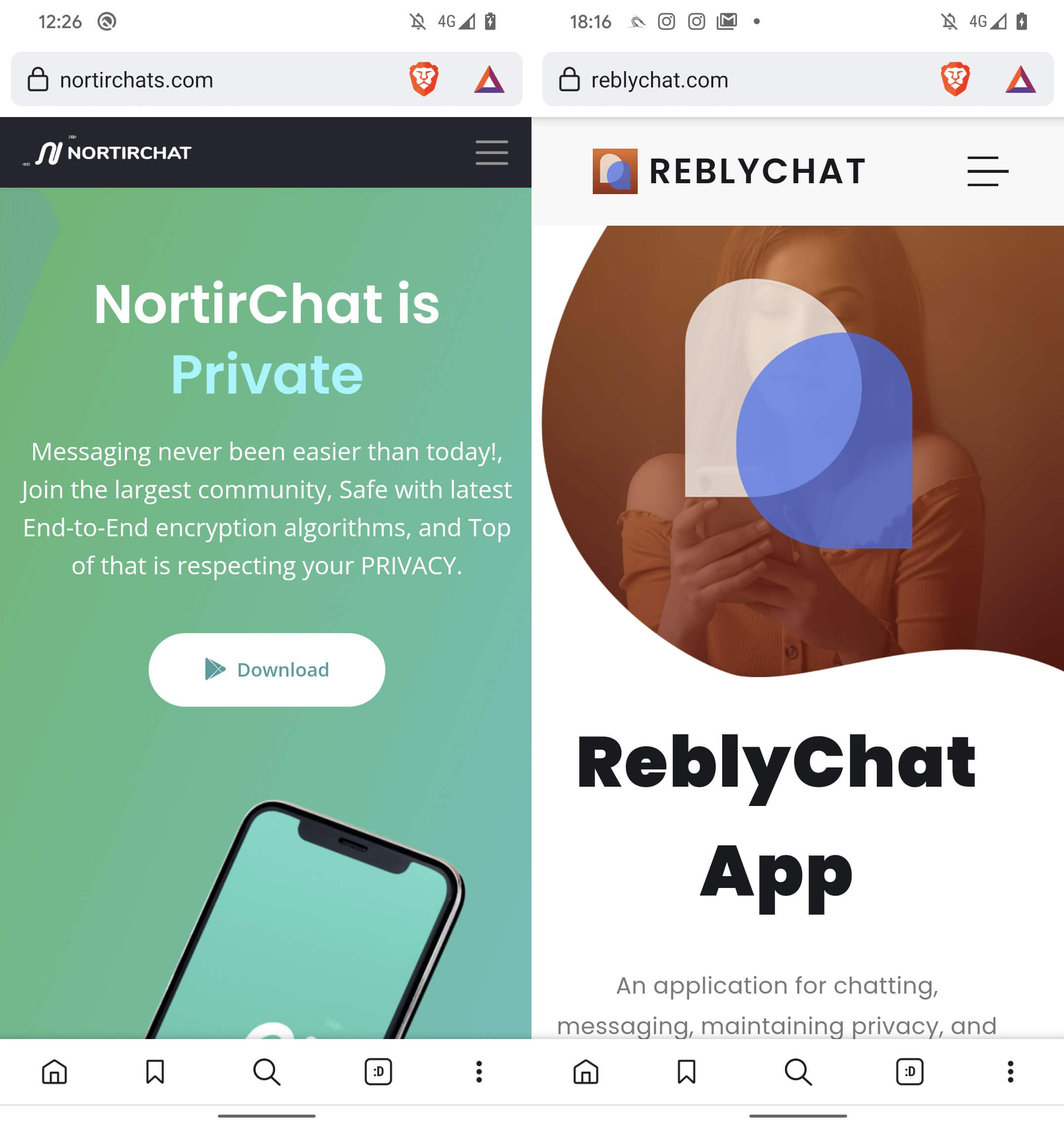
Similar to the previous case, we were able to retrieve additional samples from open directories, including both the clean and trojanized versions of the messaging applications. NortirChat is based on the legitimate Session messaging app, while ReblyChat is based on the legitimate Voxer Walkie Talkie Messenger. In both cases, the trojanized applications have the same code but the malware developers changed the application icon, name, and package name. Table 2 and Table 3 list details of the applications retrieved from these servers.
Table 2. Samples available on nortirchats[.]com website
|
Filename |
Last modified |
SHA-1 |
Description |
|
NortirChat_old.apk |
2022‑09‑28 |
13A89D28535FC1D53794 |
The legitimate Session messaging app, version 1.16.5 (3331). |
|
NortirChat.apk |
2023‑03‑19 |
1878F674F59E81E86986 |
|
|
NortirChat_old.apk |
2023‑06‑14 |
2158D88BCE6368FAC3FC |
Session app trojanized with AridSpy, distributed under the name NortirChat. |
|
NortirChat.apk |
2023‑09‑11 |
DB6B6326B772257FDDCB |
Table 3. Samples available on reblychat[.]com website
|
Filename |
Last modified |
SHA-1 |
Description |
|
reblychat.apk |
2023‑06‑08 |
FFDD0E387EB3FEF7CBD2 |
The legitimate Voxer Walkie Talkie Messenger application, version 4.0.2.22408 (3669119). |
|
reblychat-old.apk |
2023‑06‑08 |
A64D73C43B41F9A5B938 |
The Voxer Walkie Talkie Messenger app trojanized with AridSpy, distributed under the name ReblyChat. |
|
reblychat.apk |
2023‑06‑11 |
797073511A15EB85C1E9 |
Masquerading as a Palestinian Civil Registry application
Moving on from trojanizing chat applications for the time being, the operators then launched a campaign distributing an app purporting to be from the Palestinian Civil Registry (السجل المدني الفلسطيني). The malicious app claims to offer general information about the residents of Palestine, such as name, place of residence, date of birth, ID number, and other information. This campaign provides a malicious Android app available for download from palcivilreg[.]com, registered on May 30th, 2023; see Figure 6.
![Arid Viper poisons Android apps with AridSpy Figure 6. palcivilreg[.]com website](https://platoblockchain.com/wp-content/uploads/2024/06/arid-viper-poisons-android-apps-with-aridspy-4.png)
Machine translation of the website from Figure 6: “Palestinian Civil Registry. To find out information about any person or search for any person’s identity number or date of birth, download the application to search the Palestinian civil registry.”
This website is advertised via a dedicated Facebook page – see Figure 7 – that was created on July 25th, 2023 and links directly to palcivilreg[.]com. We have reported this page to Facebook.
![Figure 7. Facebook page promoting the palcivilreg[.]com website for every Palestinian to identify personal data Figure 7. Facebook page promoting the palcivilreg[.]com website for every Palestinian to identify personal data](https://platoblockchain.com/wp-content/uploads/2024/06/arid-viper-poisons-android-apps-with-aridspy-5.png)
Machine translation of the cover photo visible in Figure 7: “Palestinian Civil Registry. Search for any person’s name and obtain his full data. Get date of birth and age of any person. Ease of searching and entering the application.”
Selecting the تحميل (Download, in Arabic; see Figure 6) button executes myScript.js, initiating download from a hardcoded URL; see Figure 8. This instance of myScript.js code is slightly changed, compared to previously mentioned campaigns, but achieves the same results – retrieving a file from a malicious link. This version of the script can be found in many tutorials available online; one of its first occurrences seems to be from February 2019.
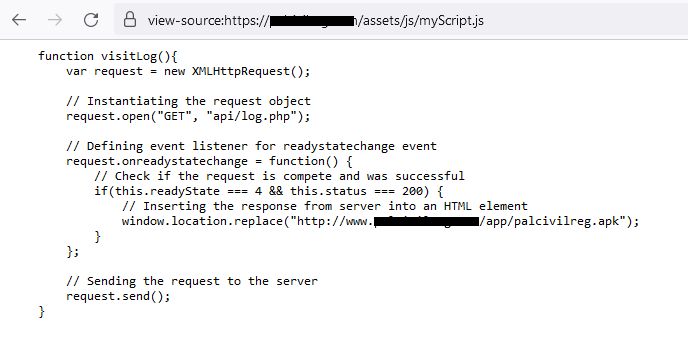
The Palestinian Civil Registry app is inspired by an app on Google Play that has been available for download since March 2020 and provides the same functionality as claimed on the palcivilreg[.]com site. The app on Google Play is linked to the website zezsoft.wuaze[.]com, which allows downloading iOS and Android apps. At the time of this research, the iOS application was not available, and the Android app link refers to the file-sharing storage site MediaFire, not to Google Play. This app was no longer available from MediaFire, so we are not able to confirm whether that version was legitimate.
Based on our investigation, the malicious app available on palcivilreg[.]com is not a trojanized version of the app on Google Play; however, it uses that app’s legitimate server to retrieve information. This means that Arid Viper was inspired by that app’s functionality but created its own client layer that communicates with the legitimate server. Most likely, Arid Viper reverse engineered the legitimate Android app from Google Play and used its server for retrieving victims’ data.
Masquerading as a job portal application
The last campaign we identified distributes AridSpy as an app named تطبيق المشغل (machine translation: Operator application; we refer to this as the job opportunity app), available for download from almoshell[.]website, registered on August 19th, 2023. This website claims to provide a job to anyone who applies through the Android app. In this case, the malicious app is not a trojanized version of any legitimate app. When supposedly applying for a job, AridSpy makes requests to almoshell[.]website for registered users. This service runs on a malware distribution website, so it is difficult to identify whether any relevant work offers are returned to the app’s user or not. The website is shown in Figure 9.

The job opportunity app has been available for download from this distribution site since August 20th, 2023; see Figure 10.

Toolset
All analyzed Android apps from these campaigns contain similar malicious code, and download first- and second-stage payloads; our analysis focuses on the NortirChat and LapizaChat campaigns, where we were able to obtain the final payloads.
Trojanized application
The campaigns mostly deploy legitimate apps that have been trojanized. In the analyzed LapizaChat and NortirChat cases, malicious functionality responsible for downloading a payload is implemented in the apputils subpackage inserted into the legitimate messaging apps, as can be seen in Figure 11.
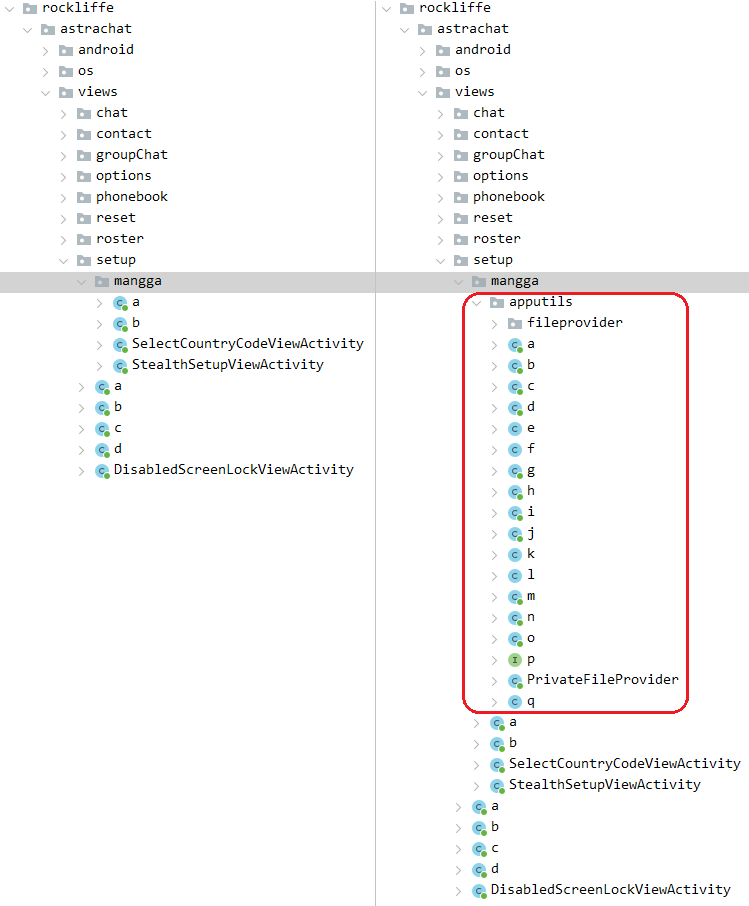
After the initial start of the app, the malware looks for installed security software based on a hardcoded list of dozens of security applications, and reports the results to the C&C server. The complete list of these apps, along with their package names, is in Table 4.
Table 4. List of security apps in the order that they appear in the code
|
App name |
Package name |
|
Bitdefender Mobile Security |
com.bitdefender.security |
|
Avast Antivirus & Security |
com.avast.android.mobilesecurity |
|
McAfee Security: Antivirus VPN |
com.wsandroid.suite |
|
Avira Security Antivirus & VPN |
com.avira.android |
|
Malwarebytes Mobile Security |
org.malwarebytes.antimalware |
|
Kaspersky: VPN & Antivirus |
com.kms.free |
|
ESET Mobile Security Antivirus |
com.eset.ems2.gp |
|
Sophos Intercept X for Mobile |
com.sophos.smsec |
|
Dr.Web Security Space |
com.drweb.pro |
|
Mobile Security & Antivirus |
com.trendmicro.tmmspersonal |
|
Quick Heal Total Security |
com.quickheal.platform.advance.blue.market |
|
Antivirus and Mobile Security |
com.quickheal.platform |
|
Security Antivirus Max Cleaner |
com.maxdevlab.cleaner.security |
|
AVG AntiVirus & Security |
com.antivirus |
|
APUS Security:Antivirus Master |
com.guardian.security.pri |
|
Norton360 Mobile Virus Scanner |
com.symantec.mobilesecurity |
|
360 Security |
com.qihoo.security |
|
Lookout Life – Mobile Security |
com.lookout |
|
dfndr security: antivirus |
com.psafe.msuite |
|
Virus Cleaner, Antivirus Clean |
phone.antivirus.virus.cleaner.junk.clean.speed. |
|
Antivirus & Virus Cleaner Lock |
com.antivirus.mobilesecurity.viruscleaner.applock |
|
GO Security-AntiVirus, AppLock, Booster |
com.jb.security |
|
Zimperium MTD |
com.zimperium.zips |
|
Intune Company Portal |
com.microsoft.windowsintune.companyportal |
|
Active Shield Enterprise |
com.better.active.shield.enterprise |
|
Harmony Mobile Protect |
com.lacoon.security.fox |
|
Lookout for Work |
com.lookout.enterprise |
|
Trellix Mobile Security |
com.mcafee.mvision |
|
Microsoft Defender: Antivirus |
com.microsoft.scmx |
|
Sophos Mobile Control |
com.sophos.mobilecontrol.client.android |
|
Jamf Trust |
com.wandera.android |
|
SEP Mobile |
com.skycure.skycure |
|
Pradeo Security |
net.pradeo.service |
If security software on the list is installed on the device, the malware will send this information to the C&C server. If the server returns the value 0, then the first-stage payload will not be downloaded. If the server returns the value 1, then AridSpy proceeds and downloads the first-stage payload. In all cases that we observed, when a security app was installed on the device, the server returned the value 0 and payloads were not downloaded.
AridSpy uses trivial string obfuscation, where each string is declared by converting a character array into a string. This method was used in every sample and even in the first published analysis by Zimperium. That same obfuscation is also applied in the first- and second-stage payloads. Figure 12 shows an example.

If security software is not installed, AridSpy downloads the AES-encrypted first-stage payload from its C&C server. This payload is then decrypted using a hardcoded key, and the potential victim is asked to install it manually. The first-stage payload impersonates an update of Google Play services, as displayed in Figure 13.
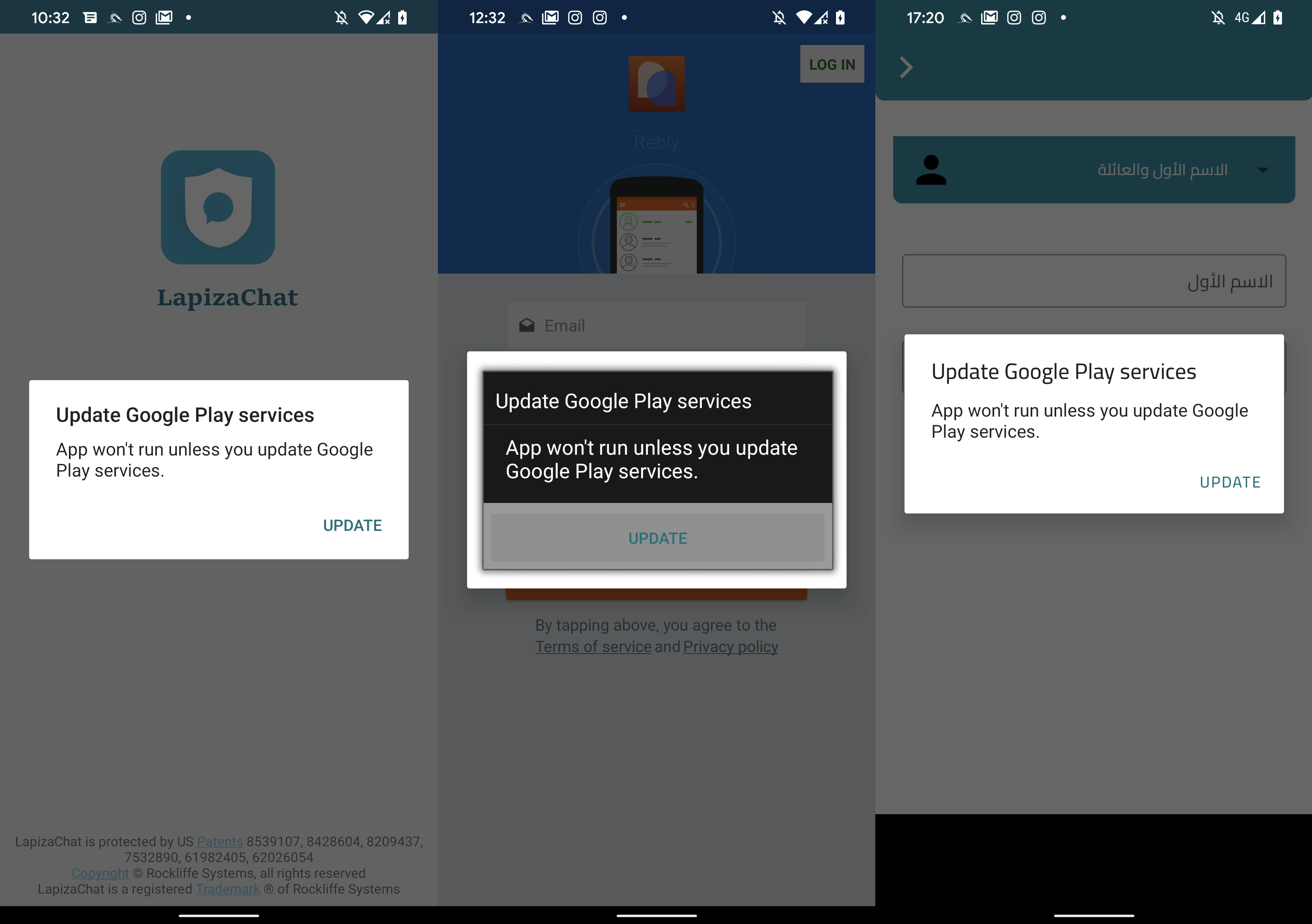
First-stage payload
During installation of the malicious update, the first-stage payload displays app names such as Play Manager or Service Google. This payload works separately, without the necessity of having the trojanized app installed on the same device. This means that if the victim uninstalls the initial trojanized app, for example LapizaChat, AridSpy will not be in any way affected.
Functionality-wise, the first-stage payload is similar to the trojanized application. It is responsible for downloading the second-stage payload, which is then dynamically loaded and executed. The first-stage payload downloads an AES-encrypted second-stage payload from a hardcoded URL and controls its further execution.
Second-stage payload
The second-stage payload is a Dalvik executable (dex); based on our observations, it always has the name prefLog.dex. The malicious functionality is implemented in this stage; however, it is operated by the first-stage payload, which loads it whenever necessary.
AridSpy uses a Firebase C&C domain for receiving commands, and a different, hardcoded C&C domain, for data exfiltration. We reported the Firebase servers to Google, since it provides the service.
When payloads are downloaded and executed, AridSpy sets listeners to monitor when the device screen is on and off. If the victim locks or unlocks the phone, AridSpy will take a picture using the front camera and send it to the exfiltration C&C server. Pictures are taken only if it is more than 40 minutes since the last picture was taken and the battery level is above 15%. By default, these pictures are taken using the front camera; however, this can be changed by receiving a command from the Firebase C&C server to use the rear camera. Images are archived in the data.zip file on internal storage and uploaded to the exfiltration C&C server.
AridSpy has a feature intended to avoid network detection – specifically C&C communication. It can deactivate itself, as AridSpy states in the code, by changing the exfiltration C&C server used for data upload to a dummy hardcoded androidd[.]com domain (a currently registered typosquat). This action occurs based on a command received from the Firebase C&C server. The dummy domain would probably look more legitimate, is not flagged as malicious, and might not trigger network detection systems.
Data exfiltration is initiated either by receiving a command from the Firebase C&C server or when a specifically defined event is triggered. These events are defined in AndroidManifext.xml and are caused when actions occur, such as: internet connectivity changes, the app is installed or uninstalled, a phone call is made or received, an SMS message is sent or received, a battery charger is connected or disconnected, or the device reboots.
If any of these events occurs, AridSpy starts to gather various victim data and uploads it to the exfiltration C&C server. It can collect:
- device location,
- contact list,
- call logs,
- text messages,
- thumbnails of photos,
- thumbnails of recorded videos,
- recorded phone calls,
- recorded surrounding audio,
- malware-taken photos,
- file structure of external storage,
- six WhatsApp databases (wa.db-wal, wa.db-shm, wa.db, msgstore.db-wal, msgstore.db-shm, msgstore.db) that contain exchanged messages and user contacts, if the device is rooted,
- bookmarks and search history from the default browser and Chrome, Samsung Browser, and Firefox apps if installed,
- data in the clipboard,
- files from external storage with file size smaller than 30 MB and extensions .pdf, .doc, .docx, .xls, .xlsx, .ppt, .pptx, and .opus,
- thumbnails from the Samsung Gallery app stored in the /storage/emulated/0/Android/data/com.sec.android.gallery3d/cache/ directory,
- all received notifications,
- Facebook Messenger and WhatsApp communication, and
- logs of all text visible by misusing Accessibility services.
Besides waiting for events to occur, the Arid Viper operator can extract specific information and upload it immediately to the exfiltration C&C server by sending commands to the compromised device. AridSpy can receive commands from its Firebase C&C server to obtain data or to control the malware. Operators can exfiltrate:
- device location,
- contact list,
- text messages,
- call logs,
- thumbnails of photos,
- thumbnails of recorded videos,
- a specific image from external storage based on an ID received from the Firebase C&C server,
- a specific video from external storage based on an ID received from the Firebase C&C server,
- recorded audio,
- images taken on demand,
- a specific file by file path received from the C&C, and
- device info such as whether Facebook Messenger and WhatsApp apps are installed, device storage, battery percentage, internet connection, Wi-Fi connection data, screen on or off status, and the time zone.
By receiving control commands, it can:
- deactivate communication by replacing the exfiltration C&C domain with the dummy value androidd[.]com,
- activate communication by replacing the dummy androidd[.]com C&C domain with another domain name,
- allow data upload when on a mobile data plan, and
- change the exfiltration C&C server for data upload.
AridSpy can snoop on user activity by keylogging all text visible and editable in any application. On top of that, it specifically focuses on Facebook Messenger and WhatsApp communications, which are stored and exfiltrated separately. To accomplish this task, it misuses built-in accessibility services to record all text visible and uploads it to the exfiltration C&C server. Examples of stored WhatsApp communications can be seen in Figure 14.
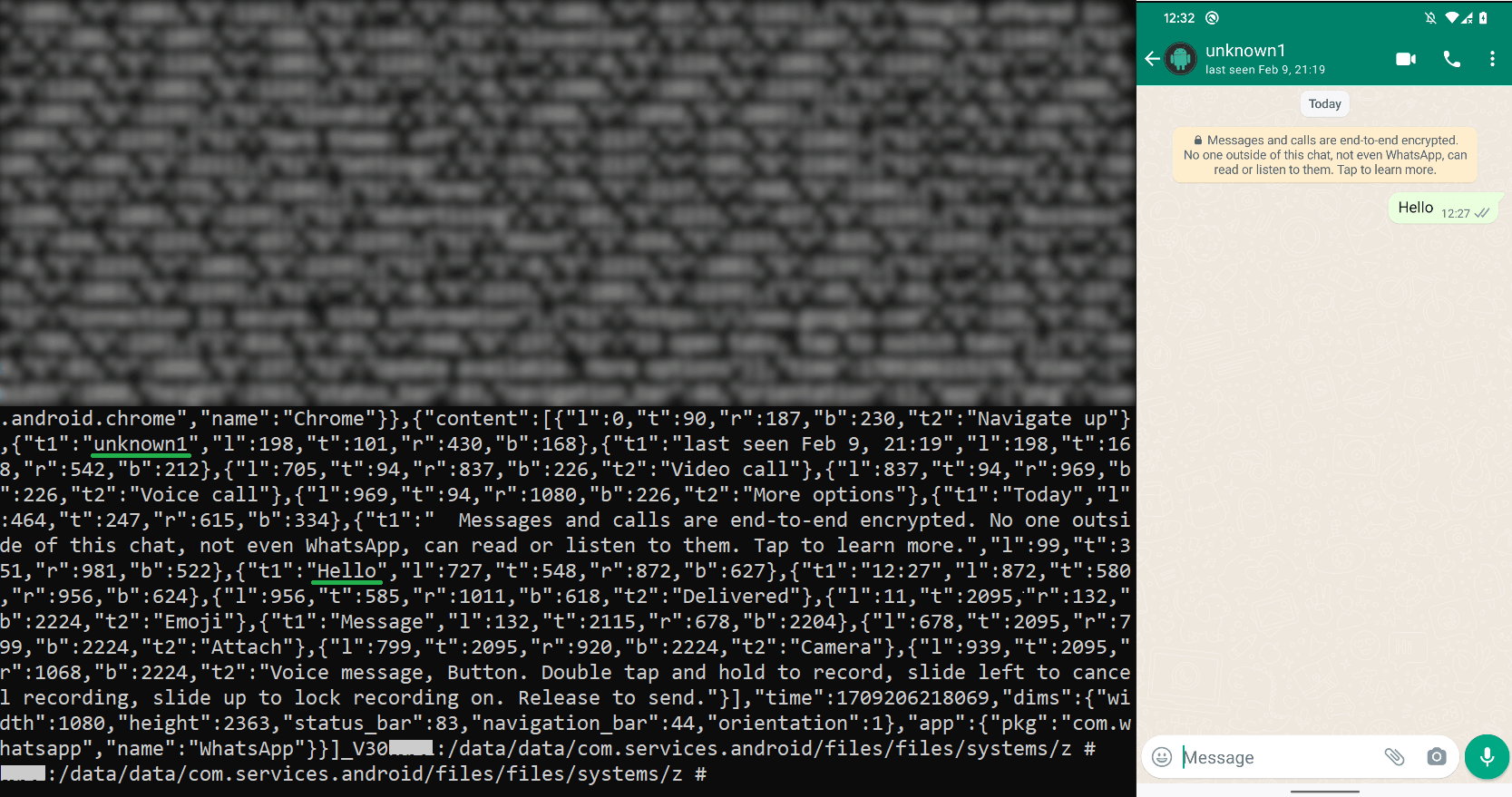
Before collected data is uploaded to the exfiltration C&C server, it is stored on internal storage, in /data/data/<package_name>/files/files/systems/, that belongs to AridSpy. The obtained contact list, SMS, call logs, location, captured keys, file structures, and other text information are stored in plain text as JSON files. All exfiltrated data is saved using specific filenames that might contain file IDs, filenames, time stamps, location, phone number, and AridSpy version. These values are divided by the delimiter #$&, as can be seen in Figure 15.

All these files from any particular subdirectory are then zipped into data.zip and encrypted using custom encryption. Each of the encrypted files uses a randomly generated filename with the _Father.zip suffix. This string is hardcoded and appended to every file. The files are then uploaded to the exfiltration C&C server and removed from the device.
While going through the decompiled AridSpy code, we identified a version number, which is used as part of the filename when exfiltrating victim data (#$&V30#$&), also visible in Figure 15 (highlighted is the version number). The AridSpy version has been changing across the campaigns and was included even with its first variant disclosed in 2021. For some of the AridSpy samples, the version number is present in the trojanized app and also in the second-stage payload. This version might be different, since the downloaded payload can be updated. In Table 5, you can see the package names and their versions. Some trojanized apps contained the version number only in their payloads, not in the body of the executable.
Table 5. Malware versions found in samples
|
App name |
Package name |
SHA-1 |
Version |
|
System Update |
com.update.system.important |
52A508FEF60082E1E4EC |
22 |
|
[without app name] |
com.weather.services.manager |
A934FB482F61D85DDA5E |
26 |
|
[without app name] |
com.studio.manager.app |
5F0213BA62B84221C962 |
26 |
|
Kora442 |
com.app.projectappkora |
60B1DA6905857073C4C4 |
27 |
|
تطبيق المشغل |
com.app.workapp |
568E62ABC0948691D672 |
29 |
|
NortirChat |
cx.ring |
DB6B6326B772257FDDCB |
30 |
|
prefLog.dex |
com.services.android.handler |
16C8725362D1EBC8443C |
30 |
|
prefLog.dex |
com.setting.manager.admin.handler |
E71F1484B1E3ACB4C8E8 |
31 |
The Version column of the table suggests that the malware is regularly maintained.
It is worth mentioning that the trojanized malicious apps used for the Palestinian Civil Registry and job opportunity campaigns have implemented malicious functionality that is then also provided in the second-stage payload. It seems very unusual to download a payload if the same functionality is already included. The duplicated malicious functionality doesn’t seem to be an intended behavior, as it is not implemented in samples for other campaigns; rather, it might be code left over from a time before the malware was updated to provide two additional stages. Even so, these two trojanized apps can receive commands and spy on victims without needing additional payloads. Naturally, the second-stage payload carries the latest updates and malicious code changes, which can be pushed to other ongoing campaigns.
Conclusion
Five campaigns, most likely operated by the Arid Viper APT group, distribute Android spyware, which we’ve named AridSpy, via dedicated websites, with AridSpy’s malicious code implanted into various trojanized apps. This malware family has two additional stages that are downloaded from a C&C server. The purpose of the second-stage payload is espionage via victim data exfiltration. AridSpy also has a hardcoded internal version number that differs in these five campaigns and from other samples disclosed before. This information suggests that AridSpy is maintained and might receive updates or functionality changes.
For any inquiries about our research published on WeLiveSecurity, please contact us at threatintel@eset.comESET Research offers private APT intelligence reports and data feeds. For any inquiries about this service, visit the ESET Threat Intelligence page.
IoCs
A comprehensive list of Indicators of Compromise (IoCs) and samples can be found in our GitHub repository.
Files
|
SHA-1 |
Filename |
Detection |
Description |
|
797073511A15EB85C1E9 |
com.rebelvox.rebly.apk |
Android/Spy.AridSpy.A |
AridSpy trojanized application. |
|
5F0213BA62B84221C962 |
com.studio.manager.app.apk |
Android/Spy.AridSpy.A |
The first stage of AridSpy. |
|
A934FB482F61D85DDA5E |
com.weather.services. |
Android/Spy.AridSpy.A |
The first stage of AridSpy. |
|
F49B00896C99EA030DCC |
com.chat.lapiza.apk |
Android/Spy.AridSpy.A |
AridSpy trojanized application. |
|
3485A0A51C6DAE251CDA |
com.chat.lapiza.apk |
Android/Spy.AridSpy.A |
AridSpy trojanized application. |
|
568E62ABC0948691D672 |
com.app.workapp.apk |
Android/Spy.AridSpy.A |
AridSpy trojanized application. |
|
DB6B6326B772257FDDCB |
cx.ring.apk |
Android/Spy.AridSpy.A |
AridSpy trojanized application. |
|
2158D88BCE6368FAC3FC |
cx.ring.apk |
Android/Spy.AridSpy.A |
AridSpy trojanized application. |
|
B806B89B8C44F4674888 |
com.app.civilpal.apk |
Android/Spy.AridSpy.A |
AridSpy trojanized application. |
|
E71F1484B1E3ACB4C8E8 |
prefLog.dex |
Android/Spy.AridSpy.A |
The second stage of AridSpy. |
|
16C8725362D1EBC8443C |
prefLog.dex |
Android/Spy.AridSpy.A |
The second stage of AridSpy. |
|
A64D73C43B41F9A5B938 |
com.rebelvox.rebly.apk |
Android/Spy.AridSpy.A |
AridSpy trojanized application. |
|
C999ACE5325B7735255D |
update.apk |
Android/Spy.AridSpy.A |
The first stage of AridSpy. |
|
78F6669E75352F08A8B0 |
update.apk |
Android/Spy.AridSpy.A |
The first stage of AridSpy. |
|
8FF57DC85A7732E4A9D1 |
update.apk |
Android/Spy.AridSpy.A |
The first stage of AridSpy. |
Network
|
IP |
Domain |
Hosting provider |
First seen |
Details |
|
23.106.223[.]54 |
gameservicesplay[.]com |
LeaseWeb USA, Inc. Seattle |
2023‑05‑25 |
C&C server. |
|
23.106.223[.]135 |
crashstoreplayer[.]website |
LeaseWeb USA, Inc. Seattle |
2023‑08‑19 |
C&C server. |
|
23.254.130[.]97 |
reblychat[.]com |
Hostwinds LLC. |
2023‑05‑01 |
Distribution website. |
|
35.190.39[.]113 |
proj3-1e67a.firebaseio[.]com proj-95dae.firebaseio[.]com proj-2bedf.firebaseio[.]com proj-54ca0.firebaseio[.]com project44-5ebbd.firebaseio[.]com |
Google LLC |
2024‑02‑15 |
C&C server. |
|
45.87.81[.]169 |
www.palcivilreg[.]com |
Hostinger NOC |
2023‑06‑01 |
Distribution website. |
|
64.44.102[.]198 |
analyticsandroid[.]com |
Nexeon Technologies, Inc. |
2023‑04‑01 |
C&C server. |
|
66.29.141[.]173 |
almoshell[.]website |
Namecheap, Inc. |
2023‑08‑20 |
Distribution website. |
|
68.65.121[.]90 |
orientflags[.]com |
Namecheap, Inc. |
2022‑03‑16 |
C&C server. |
|
68.65.121[.]120 |
elsilvercloud[.]com |
Namecheap, Inc. |
2021‑11‑13 |
C&C server. |
|
68.65.122[.]94 |
www.lapizachat[.]com lapizachat[.]com |
Namecheap, Inc. |
2022‑01‑19 |
Distribution website. |
|
162.0.224[.]52 |
alwaysgoodidea[.]com |
Namecheap, Inc. |
2022‑09‑27 |
C&C server. |
|
198.187.31[.]161 |
nortirchats[.]com |
Namecheap, Inc. |
2022‑09‑23 |
Distribution website. |
|
199.192.25[.]241 |
ultraversion[.]com |
Namecheap, Inc. |
2021‑10‑12 |
C&C server. |
MITRE ATT&CK techniques
This table was built using version 15 of the MITRE ATT&CK framework.
|
Tactic |
ID |
Name |
Description |
|
Initial Access |
Phishing |
AridSpy has been distributed using dedicated websites impersonating legitimate services. |
|
|
Persistence |
Boot or Logon Initialization Scripts |
AridSpy receives the BOOT_COMPLETED broadcast intent to activate at device startup. |
|
|
Event Triggered Execution: Broadcast Receivers |
AridSpy registers to receive the NEW_OUTGOING_CALL, PHONE_STATE, SMS_RECEIVED, SMS_DELIVER, BOOT_COMPLETED, USER_PRESENT, CONNECTIVITY_CHANGE, ACTION_POWER_CONNECTED, ACTION_POWER_DISCONNECTED, PACKAGE_ADDED, and PACKAGE_CHANGE broadcast intents to activate itself. |
||
|
Defense evasion |
Download New Code at Runtime |
AridSpy can download first- and second-stage payloads. |
|
|
Obfuscated Files or Information |
AridSpy decrypts a downloaded payload with obfuscated code and strings. |
||
|
Discovery |
Software Discovery |
AridSpy can identify whether Facebook Messenger and WhatsApp apps are installed on a device. |
|
|
Software Discovery: Security Software Discovery |
AridSpy can identify, from a predefined list, what security software is installed. |
||
|
File and Directory Discovery |
AridSpy can list files and directories on external storage. |
||
|
System Information Discovery |
AridSpy can extract information about the device including device model, device ID, and common system information. |
||
|
System Network Configuration Discovery |
AridSpy extracts the IMEI number. |
||
|
Collection |
Video Capture |
AridSpy can take photos. |
|
|
Archive Collected Data |
AridSpy encrypts data before extraction. |
||
|
Data from Local System |
AridSpy can exfiltrate files from a device. |
||
|
Input Capture: Keylogging |
AridSpy can log all text visible and specifically log Facebook Messenger and WhatsApp chat communication. |
||
|
Access Notifications |
AridSpy can collect messages from various apps. |
||
|
Audio Capture |
AridSpy can record audio from the microphone. |
||
|
Clipboard Data |
AridSpy can obtain clipboard contents. |
||
|
Location Tracking |
AridSpy tracks device location. |
||
|
Protected User Data: Call Logs |
AridSpy can extract call logs. |
||
|
Protected User Data: Contact List |
AridSpy can extract the device’s contact list. |
||
|
Protected User Data: SMS Messages |
AridSpy can extract SMS messages. |
||
|
Command and Control |
Web Service: One-Way Communication |
AridSpy uses Google’s Firebase server as a C&C. |
|
|
Exfiltration |
Exfiltration Over C2 Channel |
AridSpy exfiltrates data using HTTPS. |
- SEO Powered Content & PR Distribution. Get Amplified Today.
- PlatoData.Network Vertical Generative Ai. Empower Yourself. Access Here.
- PlatoAiStream. Web3 Intelligence. Knowledge Amplified. Access Here.
- PlatoESG. Carbon, CleanTech, Energy, Environment, Solar, Waste Management. Access Here.
- PlatoHealth. Biotech and Clinical Trials Intelligence. Access Here.
- Source: https://www.welivesecurity.com/en/eset-research/arid-viper-poisons-android-apps-with-aridspy/
- :has
- :is
- :not
- :where
- 1
- 10
- 11
- 12
- 13
- 14
- 145
- 15%
- 155
- 16
- 17
- 179
- 190
- 2020
- 2021
- 2022
- 2023
- 23
- 29
- 30
- 32
- 33
- 360
- 40
- 471
- 65
- 7
- 8
- 87
- 9
- a
- Able
- About
- above
- access
- accessibility
- accomplish
- Achieves
- across
- Action
- actions
- activate
- active
- activity
- actors
- actually
- addition
- Additional
- admin
- advance
- affected
- After
- age
- All
- allegedly
- allows
- along
- already
- also
- alternative
- Although
- always
- an
- analysis
- analyzed
- and
- android
- Another
- antivirus
- any
- anyone
- app
- appear
- Application
- applications
- applied
- applies
- Applying
- apps
- April
- APT
- arabic
- archived
- ARE
- Array
- Arsenal
- AS
- assist
- At
- attention
- audio
- AUGUST
- available
- Avast
- avoid
- avoiding
- based
- battery
- BE
- beacon
- been
- before
- behavior
- being
- believe
- belongs
- Better
- between
- birth
- Blue
- body
- both
- broadcast
- browser
- built
- built-in
- bundled
- but
- button
- by
- call
- Calls
- camera
- Campaign
- Campaigns
- CAN
- capture
- captured
- carried
- case
- cases
- caused
- changed
- Changes
- changing
- character
- chat
- Chrome
- civil
- claimed
- claims
- clean
- cleaner
- click
- client
- code
- collect
- Column
- COM
- command
- Common
- Communication
- Communications
- Companies
- company
- compared
- comparison
- complete
- comprehensive
- compromise
- Compromised
- confidence
- Configuration
- Confirm
- CONFIRMED
- connected
- connection
- Connectivity
- contact
- contacts
- contain
- contained
- contains
- content
- contents
- contrary
- control
- controlled
- controls
- converting
- convince
- copy
- correct
- could
- countries
- cover
- created
- Cup
- Currently
- custom
- data
- databases
- Date
- Dates
- December
- declared
- dedicated
- Default
- defined
- delivered
- Demand
- deploy
- deployed
- DESERT
- details
- detected
- Detection
- developers
- device
- different
- difficult
- directly
- directories
- directory
- disconnected
- discovered
- discovering
- discovery
- discussed
- discusses
- displayed
- displays
- distribute
- distributed
- distributing
- distribution
- divided
- Doesn’t
- domain
- Domain Name
- download
- downloaded
- downloading
- downloads
- dozens
- drawn
- during
- dynamically
- each
- Earlier
- ease
- East
- Egypt
- either
- embedded
- enable
- encrypted
- encryption
- Engine
- engineered
- entering
- ESET Research
- espionage
- Even
- Event
- events
- Every
- example
- examples
- exchanged
- executable
- executed
- Executes
- execution
- exfiltration
- existing
- explained
- extensions
- external
- extract
- extraction
- Extracts
- facebook messenger
- fake
- family
- FB
- Feature
- feeds
- FIFA
- fifa world cup
- Figure
- File
- Files
- final
- Find
- Firebase
- Firefox
- First
- First Look
- fits
- five
- flagged
- Focus
- focuses
- following
- For
- found
- four
- Framework
- from
- front
- full
- functional
- functionality
- further
- Gain
- Gallery
- gather
- General
- generate
- generated
- generates
- get
- GitHub
- going
- Google Play
- Google’s
- Group
- guardian
- had
- Have
- having
- here
- Highlighted
- his
- history
- hosted
- However
- HTML
- HTTPS
- ICON
- ID
- identified
- identify
- Identity
- ids
- if
- image
- images
- immediately
- implemented
- in
- inactive
- Inc.
- included
- Including
- independently
- Indicator
- Indicators
- info
- information
- initial
- initiated
- initiating
- Inquiries
- insignificant
- inspired
- install
- installation
- installed
- instance
- instead
- Intelligence
- intended
- intent
- Interface
- internal
- Internet
- internet connection
- into
- investigation
- iOS
- IT
- ITS
- itself
- January
- JavaScript
- Job
- jpeg
- json
- July
- just
- Key
- keys
- known
- Labs
- Last
- later
- latest
- Latest Updates
- launched
- layer
- Leads
- least
- left
- legitimate
- Level
- Life
- likely
- LINK
- linked
- links
- List
- Listed
- listeners
- LLC
- loads
- local
- located
- location
- Locks
- log
- logged
- longer
- Look
- LOOKS
- machine
- made
- maintained
- Majority
- MAKES
- malicious
- malware
- Malwarebytes
- manager
- manually
- many
- March
- march 2020
- max
- May..
- Mcafee
- means
- mechanism
- medium
- mentioned
- mentioning
- message
- messages
- messaging
- Messaging App
- Messenger
- method
- microphone
- Microsoft
- Middle
- Middle East
- might
- minor
- Minutes
- Mobile
- Mobile Security
- model
- modified
- Monitor
- more
- most
- mostly
- Multimedia
- name
- Named
- names
- naturally
- necessary
- necessity
- needing
- network
- never
- New
- no
- notifications
- now
- number
- obtain
- obtained
- occur
- occurrence
- of
- off
- offer
- offered
- Offers
- often
- on
- once
- ONE
- ongoing
- online
- only
- open
- open source
- operated
- operator
- operators
- Opportunity
- Option
- or
- order
- organizations
- Other
- our
- out
- over
- overview
- own
- package
- page
- Palestine
- part
- particular
- path
- paths
- percentage
- person
- personal
- personal data
- phone
- Phone call
- phone calls
- photo
- Photos
- PHP
- picture
- Pictures
- piece
- Place
- Plain
- plan
- platform
- Platforms
- plato
- Plato Data Intelligence
- PlatoData
- Play
- please
- points
- Portal
- posing
- possible
- potential
- predefined
- present
- previous
- previously
- private
- probably
- proceeds
- project
- promoting
- proven
- provide
- provided
- provides
- Publication
- published
- purpose
- pushed
- Qatar
- randomly generated
- rather
- receive
- received
- receives
- receiving
- record
- recorded
- refer
- refers
- registered
- registers
- Registration
- registry
- regularly
- relevant
- remotely
- Removed
- Reported
- Reports
- request
- requests
- research
- researchers
- Residence
- residents
- respectively
- responsible
- Results
- retrieving
- returned
- returns
- reverse
- right
- Ring
- rooted
- runs
- same
- sample
- samples
- Samsung
- saved
- scheme
- Screen
- script
- Search
- search engine
- searching
- SEC
- Second
- Section
- security
- see
- seem
- seems
- seen
- send
- sending
- sent
- September
- server
- Servers
- service
- Services
- Sets
- setting
- seven
- shared
- Shield
- shown
- Shows
- similar
- since
- single
- site
- Sites
- SIX
- Size
- smaller
- SMS
- Snoop
- So
- Software
- some
- Sources
- specific
- specifically
- speed
- spyware
- Stage
- stages
- start
- started
- starts
- startup
- States
- Status
- Stealth
- Still
- storage
- stored
- String
- structure
- structures
- studio
- such
- Suggests
- Surrounding
- switched
- system
- Systems
- table
- Take
- taken
- Target
- targeted
- targeting
- targets
- Task
- team
- Technologies
- text
- than
- that
- The
- their
- Them
- then
- There.
- These
- they
- third-party
- this
- threat
- threat actors
- three
- Through
- time
- Title
- to
- tool
- top
- Total
- tracks
- Translation
- trigger
- triggered
- Trojan
- try
- Turned
- tutorials
- two
- typical
- under
- unique
- unknown
- unlocks
- UNNAMED
- unusual
- Update
- updated
- Updates
- uploaded
- URL
- us
- USA
- use
- used
- useful
- User
- users
- uses
- using
- value
- Values
- Variant
- various
- Vast
- Ve
- version
- versions
- very
- via
- Victim
- victims
- Video
- Videos
- virus
- visible
- Visit
- VPN
- Waiting
- was
- Way..
- we
- Weather
- web
- Web Security
- Website
- websites
- were
- What
- when
- whenever
- whether
- which
- while
- WHO
- whose
- Wi-fi
- width
- will
- with
- without
- Work
- works
- world
- World Cup
- worth
- would
- X
- years
- You
- zephyrnet
- zone












